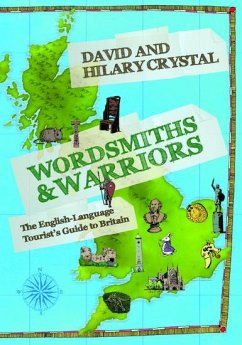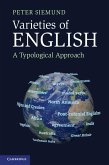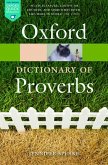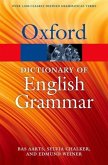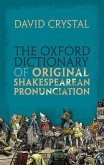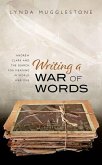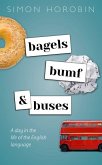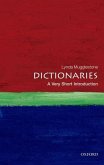18,99 €
inkl. MwSt.
Versandfertig in 2-4 Wochen

9 °P sammeln
- Broschiertes Buch
- Merkliste
- Auf die Merkliste
- Bewerten Bewerten
- Teilen
- Produkt teilen
- Produkterinnerung
- Produkterinnerung
Who formed and shaped the English language? David and Hilary Crystal take us on a journey through Britain to discover the people who gave our language its colour and character; Saxon invaders, medieval scholars, poets, reformers, dictionary writers. Part travelogue, part history, this beautifully illustrated book is full of unexpected delights.
Andere Kunden interessierten sich auch für
![Varieties of English Varieties of English]() Peter Siemund (Universitat Hamburg)Varieties of English35,99 €
Peter Siemund (Universitat Hamburg)Varieties of English35,99 €![The Oxford Dictionary of Proverbs The Oxford Dictionary of Proverbs]() Jennifer SpeakeThe Oxford Dictionary of Proverbs12,99 €
Jennifer SpeakeThe Oxford Dictionary of Proverbs12,99 €![The Oxford Dictionary of English Grammar The Oxford Dictionary of English Grammar]() Bas Aarts (Professor of English Linguistics and Director of the SurThe Oxford Dictionary of English Grammar13,99 €
Bas Aarts (Professor of English Linguistics and Director of the SurThe Oxford Dictionary of English Grammar13,99 €![The Oxford Dictionary of Original Shakespearean Pronunciation The Oxford Dictionary of Original Shakespearean Pronunciation]() David Crystal (Honorary Professo Honorary Professor of LinguisticsThe Oxford Dictionary of Original Shakespearean Pronunciation33,99 €
David Crystal (Honorary Professo Honorary Professor of LinguisticsThe Oxford Dictionary of Original Shakespearean Pronunciation33,99 €![Writing a War of Words Writing a War of Words]() Lynda Mugglestone (Professor o Professor of the History of EnglishWriting a War of Words44,99 €
Lynda Mugglestone (Professor o Professor of the History of EnglishWriting a War of Words44,99 €![Bagels, Bumf, and Buses Bagels, Bumf, and Buses]() Simon Horobin (Professor of English Language and Profes LiteratureBagels, Bumf, and Buses23,99 €
Simon Horobin (Professor of English Language and Profes LiteratureBagels, Bumf, and Buses23,99 €![Dictionaries Dictionaries]() Lynda Mugglestone (Pembroke Co Professor of the History of EnglishDictionaries13,99 €
Lynda Mugglestone (Pembroke Co Professor of the History of EnglishDictionaries13,99 €-
-
-
Who formed and shaped the English language? David and Hilary Crystal take us on a journey through Britain to discover the people who gave our language its colour and character; Saxon invaders, medieval scholars, poets, reformers, dictionary writers. Part travelogue, part history, this beautifully illustrated book is full of unexpected delights.
Hinweis: Dieser Artikel kann nur an eine deutsche Lieferadresse ausgeliefert werden.
Hinweis: Dieser Artikel kann nur an eine deutsche Lieferadresse ausgeliefert werden.
Produktdetails
- Produktdetails
- Verlag: Oxford University Press
- Seitenzahl: 440
- Erscheinungstermin: 5. März 2015
- Englisch
- Abmessung: 244mm x 169mm x 25mm
- Gewicht: 844g
- ISBN-13: 9780198729136
- ISBN-10: 0198729138
- Artikelnr.: 41771732
- Herstellerkennzeichnung
- Libri GmbH
- Europaallee 1
- 36244 Bad Hersfeld
- gpsr@libri.de
- Verlag: Oxford University Press
- Seitenzahl: 440
- Erscheinungstermin: 5. März 2015
- Englisch
- Abmessung: 244mm x 169mm x 25mm
- Gewicht: 844g
- ISBN-13: 9780198729136
- ISBN-10: 0198729138
- Artikelnr.: 41771732
- Herstellerkennzeichnung
- Libri GmbH
- Europaallee 1
- 36244 Bad Hersfeld
- gpsr@libri.de
David Crystal is known throughout the world as a writer, editor, lecturer and broadcaster on language. He has published extensively on the history and development of English, including The Stories of English (2004), Evolving English (2010), Begat: The King James Bible and the English Language (2010), The Story of English in 100 Words (2011), and Spell It Out: The Singular Story of English Spelling (2012). Hilary Crystal trained as a speech therapist, worked for a while in clinical linguistic research, then became a sub-editor for the various volumes in the Cambridge and Penguin families of encyclopedias. She has designed several books, notably the anthologies of the poetry of John Bradburne edited by David.
* 1: Pegwell Bay: arrival
* 2: Caistor St Edmund: the earliest known English word
* 3: Undley Common: the first recorded English sentence
* 4: Jarrow: Bede and the origins of English
* 5: Lindisfarne: glossaries and translations
* 6: Ruthwell: the finest runic inscription
* 7: Stourton and Edington: King Alfred and the birth of English
* 8: Maldon: the ultimate warrior wordsmith
* 9: Winchester: the first standard English
* 10: Cerne Abbas: Ælfric and the first English conversation
* 11: Ely: Wulfstan and Old English style
* 12: Peterborough: the Anglo-Saxon Chronicle
* 13: Battle and Normans Bay: the French connection
* 14: Bourne: Orrm and English spelling
* 15: Areley Kings: Layamon's English Chronicle
* 16: Chester and Berkeley: Higden, Trevisa, and the rise of English
* 17: Rhuddlan: the English language in Wales
* 18: Manorbier: little England beyond Wales
* 19: Dunfermline: the birth of Scots English
* 20: Talbot Yard, London SE1: Chaucer and Middle English
* 21: Canterbury: from ancient to modern
* 22: Cursitor Street, London EC4: Chancery and standard English
* 23: Tothill Street, London SW1: Caxton and printing English
* 24: St Albans: Juliana Berners and collective nouns
* 25: Paston: a family of letters
* 26: Lutterworth: John Wycliffe and Bible translation
* 27: North Nibley: William Tyndale and the English Bible
* 28: Chichester: William Bullokar and the first English grammar
* 29: Suffolk Lane and St Paul's, London EC4: Richard Mulcaster and the
status of English
* 30: Stratford-upon-Avon: Shakespeare and English idiom
* 31: Park Street, London SE1: Shakespeare and linguistic innovation
* 32: Oakham: Robert Cawdrey and the first dictionary
* 33: Willoughby: John Smith and new Englishes
* 34: East India Dock, London E14: the East India Company and global
English
* 35: Hampton Court Palace: King James and his Bible
* 36: Black Notley: John Ray and English proverbs
* 37: Aldwincle: John Dryden and an English Academy
* 38: Old Broad Street, London EC2: the Royal Society and scientific
English
* 39: Rochdale: Tim Bobbin and local dialect
* 40: Lichfield: Johnson and the dictionary
* 41: Old St Pancras Church, London NW1: John Walker and pronunciation
* 42: York: Lindley Murray and English grammar
* 43: Alloway: Robert Burns and Scots
* 44: Peebles and Edinburgh: the Chambers brothers and encyclopedic
English
* 45: Grasmere: William Wordsworth and poetic language
* 46: West Malvern: Roget and the thesaurus
* 47: Bath: Isaac Pitman and English shorthand
* 48: Oxford: James Murray and the Oxford English Dictionary
* 49: Winterborne Came: William Barnes and speech-craft
* 50: Higher Bockhampton: Thomas Hardy and Wessex dialect
* 51: Saltaire: Joseph Wright and English dialects
* 52: Hinton St George: Henry Fowler and English usage
* 53: Ayot St Lawrence: George Bernard Shaw and spelling reform
* 54: Laugharne: Dylan Thomas and Welsh English
* 55: Tilbury: the Empire Windrush and new dialects
* 56: University College, London WC1: Daniel Jones and English
phonetics
* 57: University College, London WC1: the Survey of English Usage
* Regional Grouping
* Index of Places
* General Index
* 2: Caistor St Edmund: the earliest known English word
* 3: Undley Common: the first recorded English sentence
* 4: Jarrow: Bede and the origins of English
* 5: Lindisfarne: glossaries and translations
* 6: Ruthwell: the finest runic inscription
* 7: Stourton and Edington: King Alfred and the birth of English
* 8: Maldon: the ultimate warrior wordsmith
* 9: Winchester: the first standard English
* 10: Cerne Abbas: Ælfric and the first English conversation
* 11: Ely: Wulfstan and Old English style
* 12: Peterborough: the Anglo-Saxon Chronicle
* 13: Battle and Normans Bay: the French connection
* 14: Bourne: Orrm and English spelling
* 15: Areley Kings: Layamon's English Chronicle
* 16: Chester and Berkeley: Higden, Trevisa, and the rise of English
* 17: Rhuddlan: the English language in Wales
* 18: Manorbier: little England beyond Wales
* 19: Dunfermline: the birth of Scots English
* 20: Talbot Yard, London SE1: Chaucer and Middle English
* 21: Canterbury: from ancient to modern
* 22: Cursitor Street, London EC4: Chancery and standard English
* 23: Tothill Street, London SW1: Caxton and printing English
* 24: St Albans: Juliana Berners and collective nouns
* 25: Paston: a family of letters
* 26: Lutterworth: John Wycliffe and Bible translation
* 27: North Nibley: William Tyndale and the English Bible
* 28: Chichester: William Bullokar and the first English grammar
* 29: Suffolk Lane and St Paul's, London EC4: Richard Mulcaster and the
status of English
* 30: Stratford-upon-Avon: Shakespeare and English idiom
* 31: Park Street, London SE1: Shakespeare and linguistic innovation
* 32: Oakham: Robert Cawdrey and the first dictionary
* 33: Willoughby: John Smith and new Englishes
* 34: East India Dock, London E14: the East India Company and global
English
* 35: Hampton Court Palace: King James and his Bible
* 36: Black Notley: John Ray and English proverbs
* 37: Aldwincle: John Dryden and an English Academy
* 38: Old Broad Street, London EC2: the Royal Society and scientific
English
* 39: Rochdale: Tim Bobbin and local dialect
* 40: Lichfield: Johnson and the dictionary
* 41: Old St Pancras Church, London NW1: John Walker and pronunciation
* 42: York: Lindley Murray and English grammar
* 43: Alloway: Robert Burns and Scots
* 44: Peebles and Edinburgh: the Chambers brothers and encyclopedic
English
* 45: Grasmere: William Wordsworth and poetic language
* 46: West Malvern: Roget and the thesaurus
* 47: Bath: Isaac Pitman and English shorthand
* 48: Oxford: James Murray and the Oxford English Dictionary
* 49: Winterborne Came: William Barnes and speech-craft
* 50: Higher Bockhampton: Thomas Hardy and Wessex dialect
* 51: Saltaire: Joseph Wright and English dialects
* 52: Hinton St George: Henry Fowler and English usage
* 53: Ayot St Lawrence: George Bernard Shaw and spelling reform
* 54: Laugharne: Dylan Thomas and Welsh English
* 55: Tilbury: the Empire Windrush and new dialects
* 56: University College, London WC1: Daniel Jones and English
phonetics
* 57: University College, London WC1: the Survey of English Usage
* Regional Grouping
* Index of Places
* General Index
* 1: Pegwell Bay: arrival
* 2: Caistor St Edmund: the earliest known English word
* 3: Undley Common: the first recorded English sentence
* 4: Jarrow: Bede and the origins of English
* 5: Lindisfarne: glossaries and translations
* 6: Ruthwell: the finest runic inscription
* 7: Stourton and Edington: King Alfred and the birth of English
* 8: Maldon: the ultimate warrior wordsmith
* 9: Winchester: the first standard English
* 10: Cerne Abbas: Ælfric and the first English conversation
* 11: Ely: Wulfstan and Old English style
* 12: Peterborough: the Anglo-Saxon Chronicle
* 13: Battle and Normans Bay: the French connection
* 14: Bourne: Orrm and English spelling
* 15: Areley Kings: Layamon's English Chronicle
* 16: Chester and Berkeley: Higden, Trevisa, and the rise of English
* 17: Rhuddlan: the English language in Wales
* 18: Manorbier: little England beyond Wales
* 19: Dunfermline: the birth of Scots English
* 20: Talbot Yard, London SE1: Chaucer and Middle English
* 21: Canterbury: from ancient to modern
* 22: Cursitor Street, London EC4: Chancery and standard English
* 23: Tothill Street, London SW1: Caxton and printing English
* 24: St Albans: Juliana Berners and collective nouns
* 25: Paston: a family of letters
* 26: Lutterworth: John Wycliffe and Bible translation
* 27: North Nibley: William Tyndale and the English Bible
* 28: Chichester: William Bullokar and the first English grammar
* 29: Suffolk Lane and St Paul's, London EC4: Richard Mulcaster and the
status of English
* 30: Stratford-upon-Avon: Shakespeare and English idiom
* 31: Park Street, London SE1: Shakespeare and linguistic innovation
* 32: Oakham: Robert Cawdrey and the first dictionary
* 33: Willoughby: John Smith and new Englishes
* 34: East India Dock, London E14: the East India Company and global
English
* 35: Hampton Court Palace: King James and his Bible
* 36: Black Notley: John Ray and English proverbs
* 37: Aldwincle: John Dryden and an English Academy
* 38: Old Broad Street, London EC2: the Royal Society and scientific
English
* 39: Rochdale: Tim Bobbin and local dialect
* 40: Lichfield: Johnson and the dictionary
* 41: Old St Pancras Church, London NW1: John Walker and pronunciation
* 42: York: Lindley Murray and English grammar
* 43: Alloway: Robert Burns and Scots
* 44: Peebles and Edinburgh: the Chambers brothers and encyclopedic
English
* 45: Grasmere: William Wordsworth and poetic language
* 46: West Malvern: Roget and the thesaurus
* 47: Bath: Isaac Pitman and English shorthand
* 48: Oxford: James Murray and the Oxford English Dictionary
* 49: Winterborne Came: William Barnes and speech-craft
* 50: Higher Bockhampton: Thomas Hardy and Wessex dialect
* 51: Saltaire: Joseph Wright and English dialects
* 52: Hinton St George: Henry Fowler and English usage
* 53: Ayot St Lawrence: George Bernard Shaw and spelling reform
* 54: Laugharne: Dylan Thomas and Welsh English
* 55: Tilbury: the Empire Windrush and new dialects
* 56: University College, London WC1: Daniel Jones and English
phonetics
* 57: University College, London WC1: the Survey of English Usage
* Regional Grouping
* Index of Places
* General Index
* 2: Caistor St Edmund: the earliest known English word
* 3: Undley Common: the first recorded English sentence
* 4: Jarrow: Bede and the origins of English
* 5: Lindisfarne: glossaries and translations
* 6: Ruthwell: the finest runic inscription
* 7: Stourton and Edington: King Alfred and the birth of English
* 8: Maldon: the ultimate warrior wordsmith
* 9: Winchester: the first standard English
* 10: Cerne Abbas: Ælfric and the first English conversation
* 11: Ely: Wulfstan and Old English style
* 12: Peterborough: the Anglo-Saxon Chronicle
* 13: Battle and Normans Bay: the French connection
* 14: Bourne: Orrm and English spelling
* 15: Areley Kings: Layamon's English Chronicle
* 16: Chester and Berkeley: Higden, Trevisa, and the rise of English
* 17: Rhuddlan: the English language in Wales
* 18: Manorbier: little England beyond Wales
* 19: Dunfermline: the birth of Scots English
* 20: Talbot Yard, London SE1: Chaucer and Middle English
* 21: Canterbury: from ancient to modern
* 22: Cursitor Street, London EC4: Chancery and standard English
* 23: Tothill Street, London SW1: Caxton and printing English
* 24: St Albans: Juliana Berners and collective nouns
* 25: Paston: a family of letters
* 26: Lutterworth: John Wycliffe and Bible translation
* 27: North Nibley: William Tyndale and the English Bible
* 28: Chichester: William Bullokar and the first English grammar
* 29: Suffolk Lane and St Paul's, London EC4: Richard Mulcaster and the
status of English
* 30: Stratford-upon-Avon: Shakespeare and English idiom
* 31: Park Street, London SE1: Shakespeare and linguistic innovation
* 32: Oakham: Robert Cawdrey and the first dictionary
* 33: Willoughby: John Smith and new Englishes
* 34: East India Dock, London E14: the East India Company and global
English
* 35: Hampton Court Palace: King James and his Bible
* 36: Black Notley: John Ray and English proverbs
* 37: Aldwincle: John Dryden and an English Academy
* 38: Old Broad Street, London EC2: the Royal Society and scientific
English
* 39: Rochdale: Tim Bobbin and local dialect
* 40: Lichfield: Johnson and the dictionary
* 41: Old St Pancras Church, London NW1: John Walker and pronunciation
* 42: York: Lindley Murray and English grammar
* 43: Alloway: Robert Burns and Scots
* 44: Peebles and Edinburgh: the Chambers brothers and encyclopedic
English
* 45: Grasmere: William Wordsworth and poetic language
* 46: West Malvern: Roget and the thesaurus
* 47: Bath: Isaac Pitman and English shorthand
* 48: Oxford: James Murray and the Oxford English Dictionary
* 49: Winterborne Came: William Barnes and speech-craft
* 50: Higher Bockhampton: Thomas Hardy and Wessex dialect
* 51: Saltaire: Joseph Wright and English dialects
* 52: Hinton St George: Henry Fowler and English usage
* 53: Ayot St Lawrence: George Bernard Shaw and spelling reform
* 54: Laugharne: Dylan Thomas and Welsh English
* 55: Tilbury: the Empire Windrush and new dialects
* 56: University College, London WC1: Daniel Jones and English
phonetics
* 57: University College, London WC1: the Survey of English Usage
* Regional Grouping
* Index of Places
* General Index
